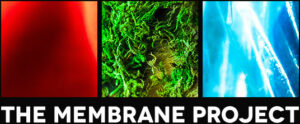
Choreographic encounters with the human and non-human

THE MEMBRANE PROJECT comprises three different choreographic creations that challenge our understanding of human identity through the encounter with other living beings beside humans. Approaching the theme from three different angles, the encounters take a critical standpoint on a culturally inherited understanding of us as superior beings.
THE MEMBRANE PROJECT challenges our working methods and the format of the choreographic work done by recoil. Presented originally in traditional theatre stages, as I collapse (2017) featured microscopic bioluminiscent algae as its unconventional protagonist. This organically developed into a new format in 2020 which will remain the final format of the piece, an “online installation” with different layers including a physical encounter of the audience with this special creatures and an online streaming session: as i collapse-online live installation (2020). Conceived for galleries, art exhibitions and unconventional spaces, MASS-bloom explorations (2018) is choreographed for thousands of plastic-eating worms and one human. Having our own species (Homo sapiens) and our way of organizing our habitats as its focal point, Extended Falls to Humanity (2019) takes place outside the art institutions and offers a co-creation with the local communities in an civic engagement process.
What follows is a brief introduction to some of the thoughts that form the philosophical foundation and inspiration for the choreographic work in THE MEMBRANE PROJECT.
The philosopher Bruno Latour points to modern man’s delusion that the market system stands above the ecosystem. He stresses the need to do away with the notion that our space is infinite, and that each of us can satisfy our needs without making an imprint. The same line of thought recurs in several publications by the artist and theorist Donna Haraway, an exceptional voice in the current movement in the arts and sciences towards the interconnection and mutual cognition between human and the non‐human.
Donna Haraway suggests, that when we ‘become with’ one another in new ways, we experience a shift in who and what we consider qualified and relevant for political life. The making of productive encounters that decenter the human and place it outside of itself presents a ground, upon which the future – future ethics, future politics – can be built, a future of great openness.
Being open to biologies and biological processes that do what and go where our bodies cannot, thereby places us in intimate conversation with the limits of ‘the human’ and the vast potential of life outside of it.
